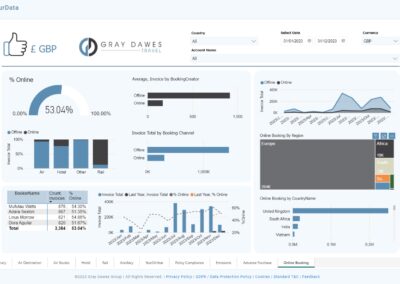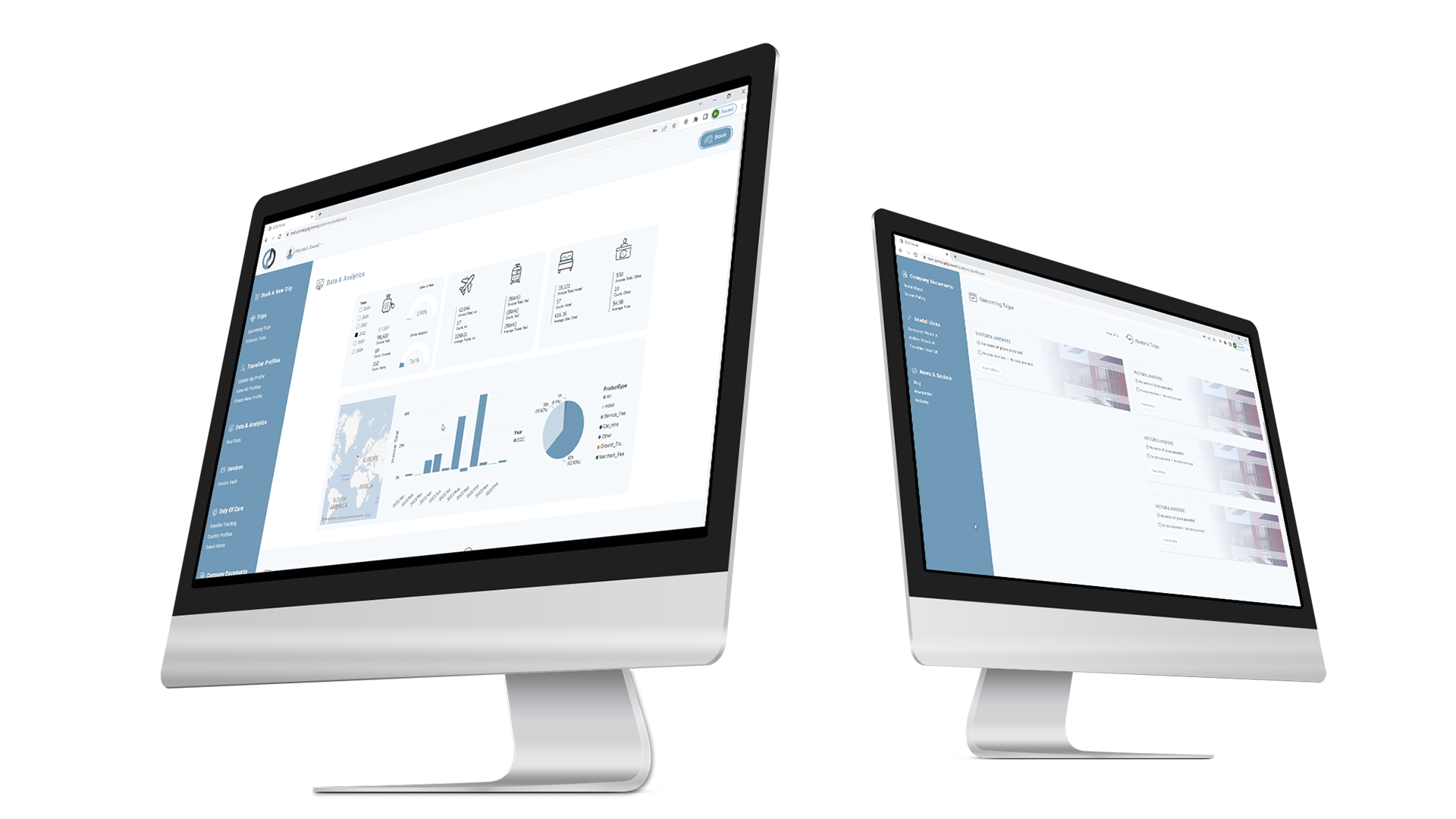6 Business Travel Problems That Can be solved by data
Are you getting the most out of your travel intelligence?Data is one of the Core Foundations of Better Business Travel…
Business travellers and travel bookers have access to more data than ever before. Analysis is officially in vogue: facts and figures can be found in the unlikeliest of places (if you know where to look) and they have the power to tell compelling stories.
In business travel, as in other industries, data is more than a synonym for spools of numbers and stuffy graphs. It is a force that can be channelled to identify trends to save you money on fares, pinpoint travel preferences, or help you make more sustainable choices.
In this article, we take a look at 6 problems that can be solved by having access to accurate travel data and how you can start using it to optimise your travel programmes.
1️⃣
My Travellers Are Booking Outside of Travel Policy
Problem
Non-compliance with travel policies and overspending can significantly impact your bottom line. When employees disregard travel guidelines, it can lead to increased costs and potential safety issues.
Solution
Analyse historical travel data to identify patterns and trends that highlight areas of concern. Ask yourself:
➤ Are the majority of bookings being made through the approved channels (e.g., our YourTrip online booking tool)?
➤ Are employees choosing preferred suppliers as outlined in the policy & guided by the YourTrip booking system?
➤ Are employees selecting accommodation within the specified rate ranges or booking flights in your preferred class and routes?
Reporting provides clear metrics and analysis of all the above. Using these insights, you can pinpoint areas of policy non-compliance (i.e. who is booking in or out of policy) or overspending to build plans to identify saving opportunities or develop targeted training programs to enforce your travel policy more effectively.
2️⃣
I Don’t Know If I’m Getting the Best Value From My Bookings
Problem
Without access to comprehensive travel data, you are likely to miss opportunities to make significant savings within your travel programme, whether that be through booking cheaper flights or securing negotiated hotel rates.
Solution
By leveraging data-driven insights, you can make more informed choices, increase the cost-effectiveness of your travel, and negotiate better deals with suppliers.
➤ Data can be used to identify optimal travel times to avoid peak periods and secure lower fares.
➤ Benchmarking allows you to analyse your performance against your peers, enabling your organisation to make informative decisions designed to maximise booking value.
➤ If working in partnership with a travel management company (TMC) like Gray Dawes, collected data can be used as a bargaining chip when negotiating special discounts with suppliers of hotels, airlines, and more.
3️⃣
It is Difficult to Manage Expenses From Multiple Sources
Problem
Without access to accurate travel data, the expense management process is infinitely more complex. Expenses come in many forms, from meal costs to parking fees, and if they are not monitored they can quickly spiral out of control.
Solution
Ensure you are using an online booking tool which can collect travel data and work seamlessly with an expense management system that simplifies the entire process.
➤ By integrating travel data with expense management software, expense reports can be automatically generated, reducing manual effort and errors.
➤ Detailed travel data can simplify audits and ensure compliance with tax regulations and internal policies.
➤ Data-driven insights can help you make informed decisions about travel budgets and policy adjustments.
At Gray Dawes, we have formed a partnership with Certify to offer a simple, end-to-end automated travel and expense management system. Our clients can now book travel itineraries that seamlessly integrate with Certify expense management software, making the expense process streamlined and paperless.
4️⃣
I’m Unsure Whether My Travel Budget is Realistic or Feasible
Problem
Budget planning doesn’t happen in a vacuum. A lack of trend analysis or historical data will turn decisions about how much money needs to be allocated to different parts of your travel programme into a guessing game.
Solution
Data can be used to set realistic travel budgets and give you an overview of how a specific business area, cost centre, or service line is performing over time.
➤ If possible, benchmark your travel costs against industry standards to identify areas for improvement. A TMC should have access to data to help you set these benchmarks.
➤ Continue to monitor real-time travel expenses to ensure they align with the budget and readjust if necessary.
Once you have set a budget, you need technology that can take travel spend data and measure it against your pre-agreed targets. Our online reporting system YourData, powered by Microsoft BI, can be used to create custom reporting dashboards and monitor costs against your agreed KPI’s on the fly.
Get Deeper Travel Insights With YourData
YourData provides you with full and detailed reporting covering every area of travel spend, ensuring complete visibility of your travel programme and highlighting any areas of opportunity for improvement.
Powered by Microsoft BI, data reports can be accessed online through a secure individual login or monthly PDF reports sent to each of your budget holders across the company, helping you monitor performance live against agreed KPI’s.
5️⃣
I’m Not Sure How to Make My Travel Programme More Sustainable
Problem
Without data to track or compare the environmental impact of your organisation’s travel, it is nearly impossible to know what adjustments you need to make or what initiatives to adopt to meet your ESG goals.
Solution
Any data reporting tool worth its salt will enable you to analyse your travel patterns, monitor your carbon footprint, and measure the benefits of carbon offsetting programmes.
➤ Travel data can reveal the most frequently used modes of transport for business trips and identify high-carbon options. This can then be used to determine opportunities to use sustainable alternatives like trains or electric vehicles.
➤ By collecting data on flight distances, hotel energy consumption, and ground transportation, companies can calculate the carbon footprint of each business trip.
➤ Travel data can help companies identify opportunities to offset their carbon emissions through investments in renewable energy projects or reforestation initiatives.
6️⃣
I Don’t Know If My Travellers Are Getting the Best Travel Experience
Problem
Traveller wellbeing is just as important as cost-saving measures. If you can’t monitor the experience of your travellers on a business trip, you won’t be able to tailor your travel programme to suit individual needs.
Solution
You can create a more comfortable, safe, and fulfilling experience for your travellers with the help of accurate data regarding travel preferences.
➤ Travellers with specific needs, such as accessibility requirements, can benefit from data-driven recommendations for hotels and accommodations that meet their specific requirements.
➤ By analysing past travel preferences and behaviours, travel management companies (TMCs) can create personalised itineraries that cater to individual needs and preferences e.g. preferred travel routes.
➤ By tracking traveller locations and monitoring news feeds, TMCs can provide real-time alerts about potential security threats, natural disasters, or travel disruptions.
In Summary
Through the power of travel data, companies can optimise their travel programs, reduce costs, and improve the overall travel experience for their employees. Travel data encompasses a wide range of information, including booking details, itinerary information, traveller preferences, and expense reports. This data can be collected from various sources, such as travel management companies (TMCs), online booking tools, and corporate expense management systems. By analysing this data, businesses can:
- Identify spending patterns, such as peak travel times and popular destinations, and adjust travel programmes accordingly.
- Provide travellers with real-time updates on flight delays, cancellations, and other disruptions.
- Monitor compliance with travel policies and identify slippage and areas where improvements can be made.
- Predict future travel trends and make informed decisions about budget allocation and policy adjustments
It is also important to ensure that you have the right technology in place to effectively monitor and make use of this data. This includes our very own YourData reporting tool, accessible via PORTAL – our single sign-on solution giving access to our entire suite of online travel tools.
PORTAL
Complete travel management at your fingertips
The Power of Travel Technology + Data
Quite simply, Portal from Gray Dawes is a game changer – the powerful new online home for the management of your entire business travel programme.
From a single sign-on, you’ll be making bookings and tracking traveller well-being, checking destination statuses or downloading invoices, managing your traveller profiles and running customised analytical reports on your travel trends.
Portal does it all and so much more in a single, intuitive online environment.
PORTAL includes in-platform access to our intelligent data reporting tool YourData, powered by Microsoft’s PowerBI, which can analyse your travel dataset in real time to help identify trends and inform future travel policy.
Related Articles
The Practical Guide to Maximising Traveller Wellbeing
How can you keep your travellers happy before, during and after a trip? What steps can you and your TMC take to ensure that their experiences on the road are healthy and relatively stress-free? In this practical guide to traveller wellbeing, we take a deep dive into how travel bookers can better support employees both away on a work trip and when they come home.
Paris: A Business Traveller’s Guide
Nestled on a north-curving arc of the vast river Seine, Paris is renowned the world over for its history-rich streets, its devotion to fine art and fashion, and its unrivalled menu of gastronomic delights, from melt-in-the-mouth croissants to the sweet taste of French onion soup. The city and broader Paris region is also a significant economic and diplomatic powerhouse at the heart of Europe – its nominal GDP of ~£640 billion in 2021 was the highest in the entire European Union, and 29 companies listed in the Fortune Global 500 call the area home. In this comprehensive guide to Paris for business travellers, we delve deeper into navigating the city’s unique corporate landscape, offer our top tips for getting around, and pick out our top 3 things to see or do to make your trip unforgettable.
Travel Talks – Wellbeing
Discover how to keep your corporate travellers happy and healthy while they’re away on business. In this Travel Talks episode, we explore exactly what Traveller Wellbeing actually is, why it’s so important to both employees and employers, and we present a host of easy to adopt strategies for healthier business trips.
LET'S TALK
Fill in the form below and we'll get back to you as soon as we can.









